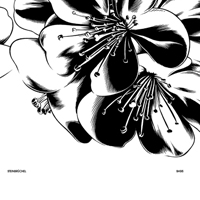
Ralph Steinbrüchel has never met a sound he couldn't smear, tweak, recontextualize or reanimate. Originating from that most opaque of categorical rubrics-microsound-few if any of Steinbrüchel's allies attain the same level of intimacy with the textures they choose to transform. The dichotomy at work within this artist's margins is twofold: an innate understanding of what sound is and what he wants to achieve, as well as that peculiar ability to arrive at destinations far removed yet strongly echoed from their sources. Steinbrüchel's body of work isn't especially huge but it is enormously significant, a result of imbalance in the cosmos that sorely needs redressing: in fact, much like the Guild navigators in Frank Herbert's science fiction classic Dune fold space, Steinbrüchel essentially does the same with the aural senses.
Each of the three "sections" on Basis are "relocated" from former elsewheres to new elsewheres. Four tracks marked "Interlude" are reshaped guitar-based works culled from Room40 head honcho Laurence English's Cronica release Happiness Will Befall, while two tracks nicked as "These" began as pieces taken from Ben Frost's Theory of Machines (Bedroom Community), and the lone work "Falter" a reworked piano piece by Bernd Schurer that began life as an installation design in Berne, Switzerland. If there is any commonality in the sonic jetsam Steinbrüchel mutates it is that of guitar, but "guitar" becomes little more than signifier in this instance, relegated to mere entrail and subatomic particle, the word itself a ghost of its former self.
Nevertheless, the soft focus buzz and muted caterwauling resonances that imbibe "Interlude 2" somehow rescue the guitar's latent sting, though mixed so smoothly that the resultant mass becomes a vast, percolating echo chamber, a cluster of pearlescent noises that sustain form, shudder and evaporate quickly. Even more powerful is Steinbrüchel's utter destruction of the keyboard fundamentals of "Falter", wherein the piano's cadence is wiped out in favor of humid crackle, brushed metal static charge, unknown residual tones piping in the distance — yet curiously retaining the faintest of white-key tone decay. Across the piece's 19-plus minutes, time stops while the diffuse sounds attempt to congeal; they seem to remain strangely poised in time and space, while Steinbrüchel folds their oblique strategies right before our very eyes/ears, opening up the ambient space, revealing the striations that color it. Superb.
Comments and Feedback:
|



